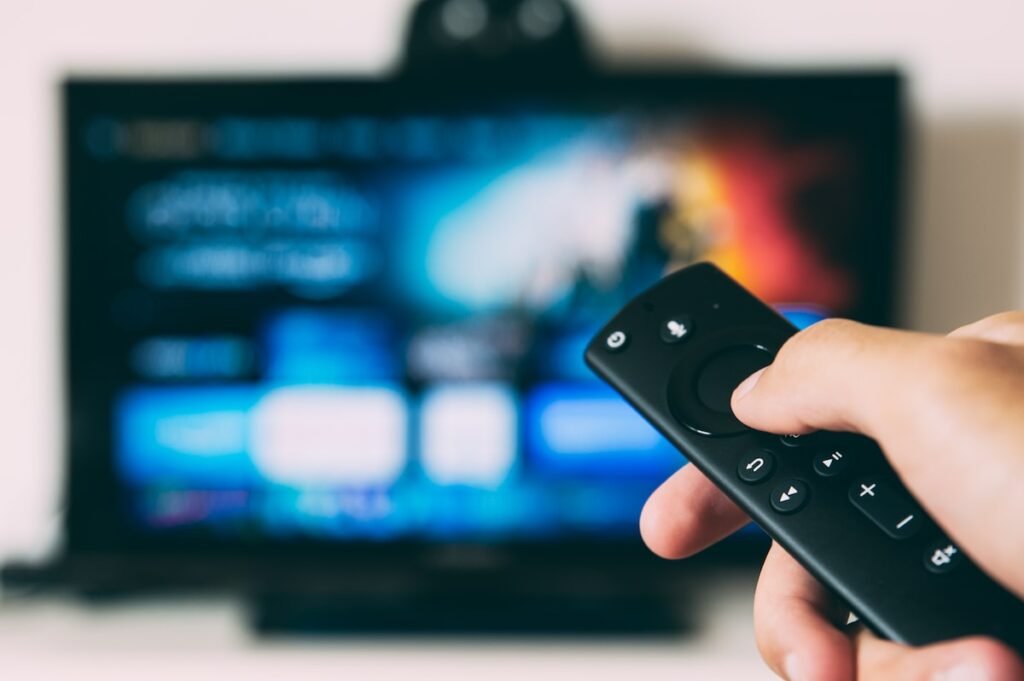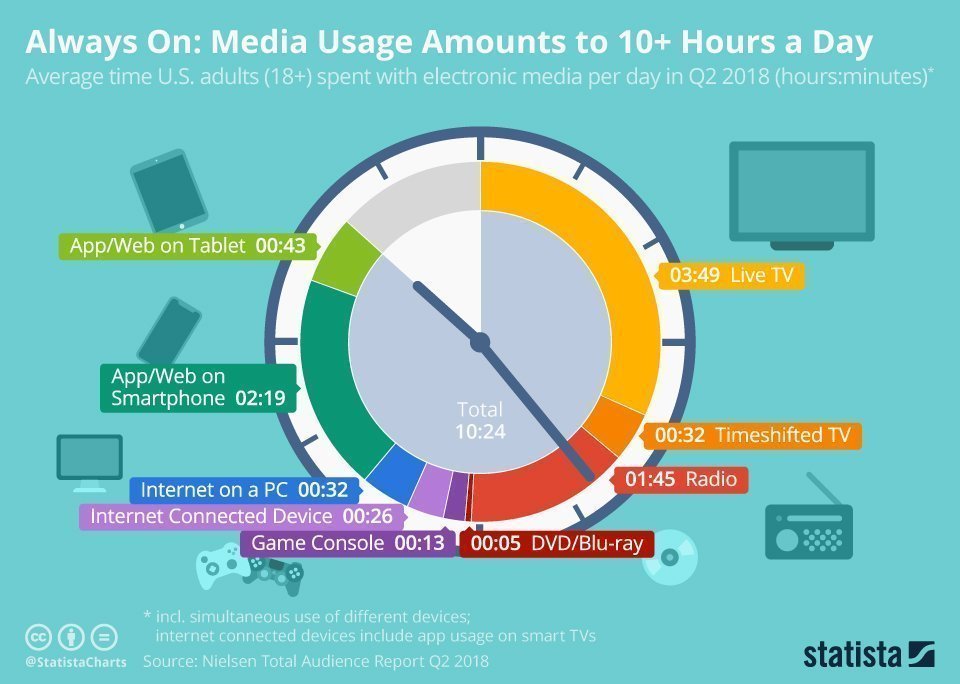Is Television Really Harming Your Brain?

Our ancestors, the early humans who roamed the Earth thousands of years ago, led lives that were vastly different from our own. Their days were filled with constant movement, hunting for food, and exploring their surroundings to ensure their survival. Their caves’ walls served as a canvas for primitive artwork, providing glimpses into their daily lives and allowing them to share their experiences with others. Today, our caves’ walls have evolved into screens bursting with different forms of content and endless information. As we transition from a hunter’s lifestyle to a sedentary, screen-centric existence, we invite you to examine the impact of this change on our cognitive health and well-being.
We are constantly bombarded with information and distractions, from the latest news to our favourite TV shows. It is easy to get caught up in the world of entertainment and let hours slip away as we are glued to our screens. While television provides a welcome escape from reality and offers moments of relaxation, it is crucial to understand its negative impact on our mental health. How long are you sitting in front of a screen every day without moving? Technology has revolutionized the strain placed on our eyesight.
Television is no longer the primary offender (although the average household viewing time has more than doubled since the 1950s). Screen time has experienced a much more rapid growth beyond the confines of the living room. According to Nielsen, American adults aged 18 and older now spend a cumulative 11 hours per day engaging with electronic media, such as TVs, smartphones, and computers.
This article aims to inspire you to re-evaluate your screen time habits, embrace a healthier lifestyle, and unlock the true potential of your mind by finding a healthy balance between television, physical activity, and cognitive stimulation. It’s time to take control of your well-being and embark on a journey towards a sharper, more vibrant mind.

The caveman lifestyle: a tale of constant movement
Our early ancestors were designed to be in constant motion. They relied on their physical strength, endurance, and agility to hunt and navigate their habitat. This continual movement served as the foundation of their cognitive health, as their brains developed and adapted to meet the challenges they faced each day. The physical activity inherent in the caveman lifestyle not only ensured their survival but also contributed to their mental well-being and overall brain function.
Our lifestyle has dramatically changed since. Gone are the days of hunting for the next meal. Instead, many of us are now glued to our screens, engrossed in the world of entertainment, social media, and technology. While the walls of our ancestors’ caves once offered a means of communication and expression, today’s “walls”—our screens—have become both a source of information and a barrier to physical activity and cognitive stimulation.
As our addiction to screen has grown, the time we devote to physical activity has declined. The constant movement that once defined our existence, is replaced with sitting and watching television or staring at our computer monitors and smartphones. This sedentary lifestyle, compounded by a lack of cognitive stimulation and physical exercise, has led to an alarming increase in cognitive decline and related health issues.

Our ancestral roots: combining movement and screen time
To mitigate the potential risks of excessive screen time and a sedentary lifestyle, it is crucial to embrace our ancestral roots and prioritize movement in our daily lives. By integrating regular exercise, cognitive stimulation, and social interactions into our routines, we can achieve a balance between screen time and our cognitive health.
The television has long been a staple in modern households, providing a seemingly endless array of entertainment, information, and education. However, the question of whether watching television is actually bad for our brains has been a topic of ongoing debate among scientists and health experts. The latest scientific research brings the evidence to answer this question and explores the potential impact of regular exercise on mitigating any adverse effects.

The link between television and cognitive decline
In a ground-breaking study conducted in 2005, researchers discovered a startling correlation between the amount of television watched in middle age and the risk of developing Alzheimer’s disease later in life. After adjusting for factors such as year of birth, gender, income, and education, they found that for each additional hour of television viewing, the risk of Alzheimer’s increased by 1.3 times.
The researchers postulated that this could be due to the sedentary nature of television watching, which may reduce overall cognitive engagement and contribute to cognitive decline over time. A more recent study in 2017, supported these findings by revealing that adults who watched more than 3.5 hours of television per day experienced a decline in memory and cognitive function over six years compared to those who watched less.

The power of exercise and cognitive stimulation
In contrast to the potentially negative effects of excessive television watching, numerous studies have highlighted the importance of regular exercise and intellectual stimulation in maintaining cognitive health. Participating in activities such as reading, puzzles, and social interactions has been shown to decrease the risk of developing Alzheimer’s disease (Wilson, 2002).
Moreover, engaging in regular physical exercise has been linked to improved cognitive function, reduced risk of dementia, and overall better mental health (Ahlskog , 2011). These findings suggest that by remaining active both physically and mentally, it may be possible to counteract some of the negative effects of television viewing.

Is watching television still bad if you exercise regularly?
While the research on this specific topic is limited, the combination of regular exercise and intellectual stimulation seems to offer some protection against cognitive decline. By staying active, it is possible to enhance brain function and potentially minimize the negative impacts of television viewing.
However, it is important to note that moderation is key. While some television watching can be beneficial, particularly when it comes to educational content, excessive screen time could still lead to negative outcomes. It is vital to strike a balance between sedentary screen time and engaging in cognitively stimulating activities and exercise to promote overall brain health.
The evidence suggests that watching excessive amounts of television may have negative consequences for our brains, particularly when it comes to cognitive decline and the risk of developing Alzheimer’s disease. However, maintaining an active lifestyle and engaging in mentally stimulating activities could help counteract these effects.
While the question of whether television is inherently bad for our brains remains open for debate, it is clear that striking a balance between screen time and other activities is crucial for preserving our cognitive health. So, instead of binge-watching your favourite show, consider adding some exercise and brain-boosting activities to your daily routine to keep your mind sharp and healthy.
Creating a healthy routine to balancing television time and physical activity
The UK Biobank study revealed a concerning connection between television viewing time and cognitive decline. With such a large sample size, these findings further emphasize the potential risks of excessive television consumption on our cognitive health. It is crucial to consider how we can balance our television time with physical activity to lower the risk of dementia and other cognitive impairments.
To reduce the risks associated with excessive television viewing, it is important to incorporate regular exercise and cognitive stimulation into your daily routine. Here are a few suggestions on how to create a healthy balance:
Set limits on television time: Establish a daily limit for television viewing and stick to it. This will help ensure that you have ample time for other activities that contribute to your cognitive health.
Engage in regular exercise: Aim for at least 150 minutes of moderate-intensity aerobic exercise or 75 minutes of vigorous-intensity aerobic exercise per week, as recommended by the American Heart Association. This can include activities such as walking, running, swimming, or cycling.
Prioritize cognitive stimulation: Dedicate time each day to engage in intellectually stimulating activities such as reading, solving puzzles, or playing strategy games. These activities can help maintain and improve cognitive function.
Foster social connections: Engage in regular social interactions with friends, family, and community members. Socializing can help reduce stress and promote mental well-being, which is beneficial for cognitive health.
Select educational content: If you do watch television, consider choosing educational or intellectually stimulating programs that can contribute to your cognitive health, rather than purely entertaining content.
While television viewing can be a source of relaxation and entertainment, the mounting evidence suggests that excessive time spent watching television may be harmful to our cognitive health. By incorporating regular exercise, cognitive stimulation, and social interactions into our daily routines, we can mitigate the risks associated with excessive television viewing and promote overall cognitive well-being. So, the next time you reach for the remote, remember you have the a better choice to keep your brain healthy and sharp: your running shoes!
As we navigate the ever-evolving landscape of modern society, it is essential to remember the importance of physical movement and cognitive stimulation in maintaining our health and well-being. By taking cues from our ancestors and incorporating elements of their active lifestyles into our own, we can find the perfect balance between screen time and a vibrant, healthy mind. So, put down the remote, step away from the screen, and embrace the power of movement to unlock your full cognitive potential.





